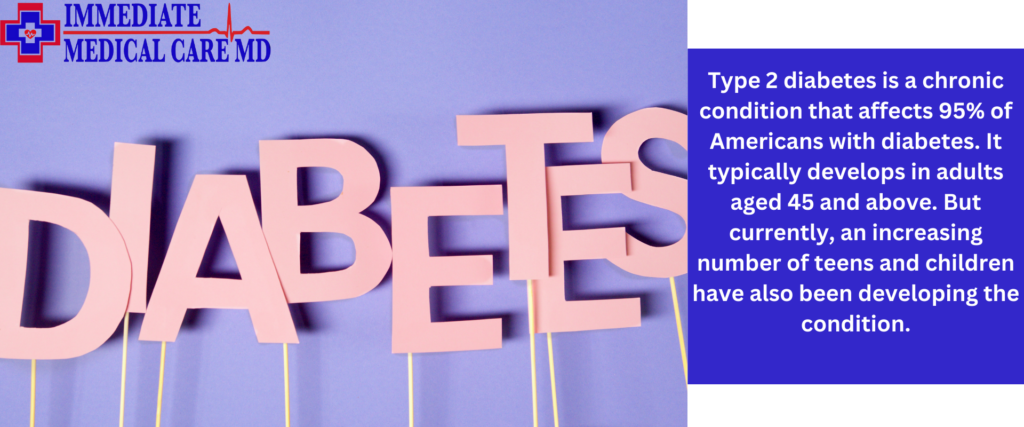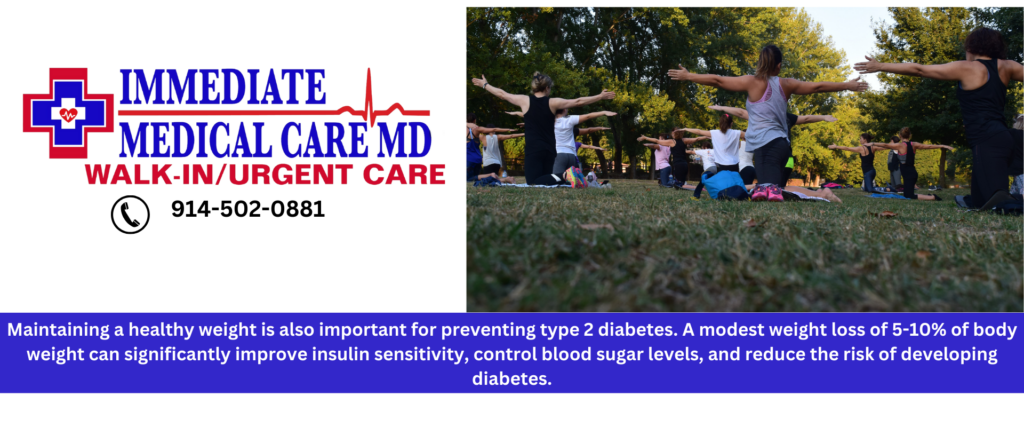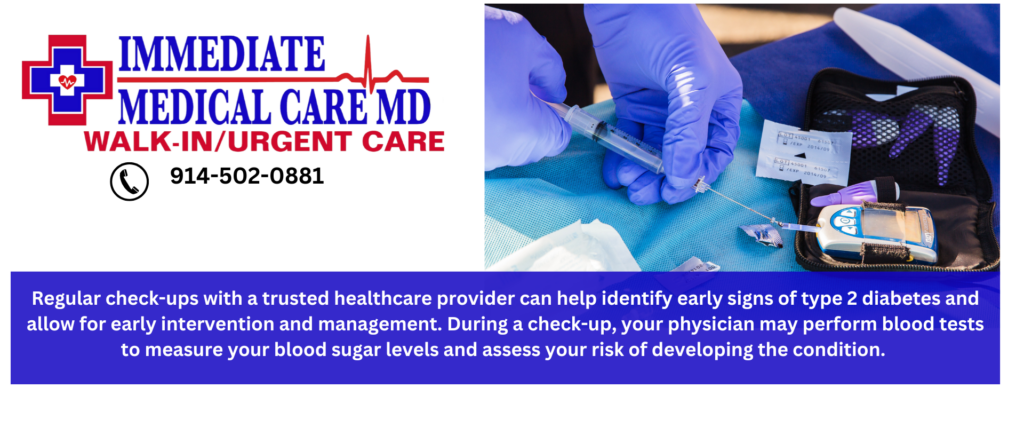8 Simple Lifestyle Changes to Reduce Your Risk of Type 2 Diabetes
Type 2 diabetes is a chronic condition that affects 95% of Americans with diabetes. It typically develops in adults aged 45 and above. But currently, an increasing number of teens and children have also been developing the condition.
Fortunately, it is possible to prevent type 2 diabetes by adopting healthy habits and making lifestyle changes. In this article, we will discuss how to prevent type 2 diabetes and provide tips for reducing your risk.
What is type 2 diabetes?
Type 2 diabetes is a chronic metabolic disorder that affects how the body processes glucose or blood sugar. It is caused by familial genes, genetic mutation, lifestyle factors, or a combination of the three.

In type 2 diabetes, the body becomes resistant to insulin一a hormone responsible for controlling blood glucose levels. This means that the cells in the body do not respond to insulin properly, and the pancreas has to produce more insulin to compensate. Over time, this can lead to a buildup of glucose in the bloodstream, thus causing a variety of health problems.
Some of the most common type 2 diabetes symptoms include the following:
- Increased thirst and urination
- Fatigue
- Blurred vision
- Slow-healing wounds
- Tingling or numbness in the hands or feet
Several risk factors can increase the likelihood of developing this type of diabetes. Some of these include age, family history, obesity, ethnicity, and lifestyle.
How to prevent and reduce your risk for type 2 diabetes?
An unhealthy and sedentary lifestyle is a huge contributing factor in developing type 2 diabetes. So, here are some healthy practices you can adopt towards a healthier lifestyle to significantly reduce your risk of type 2 diabetes and improve your overall health and well-being.
1. Eat a healthy diet
Eating a healthy and balanced diet is one of the best ways to reduce your risk of type 2 diabetes. Focus on whole, nutrient-packed foods such as green leafy vegetables, fruits, lean protein, healthy fats, and whole grains.
You should also avoid highly processed foods that are high in added sugars, unhealthy fats, and sodium, as they can increase your risk of diabetes.
Additionally, making healthy food choices and managing portion sizes are important for maintaining a healthy weight and reducing the risk of chronic health conditions such as type 2 diabetes. Here are some healthy eating tips you can live by:
- Choose foods that are high in nutrients.
- Always read the label.
- Plan meals in advance.
- Use smaller plates to manage portion sizes.
- Control portions when eating out.
- Practice mindful eating.
- Avoid emotional eating.
Proper diet and nutrition can help regulate blood sugar levels, improve insulin sensitivity, and reduce inflammation in the body.
2. Stay active
Physical activity plays a critical role in preventing the development of type 2 diabetes and other chronic illnesses, for that matter. Regular exercise helps manage your weight, control blood pressure, lower harmful cholesterol levels, strengthen bones and muscles, and reduce anxiety.
Regular exercise also has some added benefits for preventing diabetes or managing the condition. This includes the following:
-
Improves insulin sensitivity
Exercise helps the body use insulin more effectively, reducing the risk of insulin resistance, a key factor in the development of type 2 diabetes.
-
Promotes weight loss
Exercise can help with weight loss or maintaining a healthy weight, thus reducing one’s risk for type 2 diabetes.

-
Reduces inflammation
Chronic inflammation has been linked to the development of type 2 diabetes, and regular exercise can help reduce inflammation in the body.
-
Lowers blood sugar levels
Exercise can help lower blood sugar levels by increasing the glucose uptake of the muscles, thus reducing the risk of developing type 2 diabetes.
It’s recommended that adults get at least 150 minutes of moderate-intensity exercise per week, such as brisk walking, cycling, swimming, and other forms of aerobic exercise.
3. Maintain a healthy weight
Maintaining a healthy weight is also important for preventing type 2 diabetes. When we consume excess calories, the body stores the excess energy in the form of fat.
Over time, excess body fat can lead to insulin resistance, wherein the body’s cells will become less and less responsive to insulin, thus leading to the development of type 2 diabetes.
Even a modest weight loss of 5-10% of body weight can significantly improve insulin sensitivity, control blood sugar levels, and reduce the risk of developing diabetes.
4. Limit alcohol consumption
Moderate alcohol consumption may not be harmful to most people. However, excessive alcohol consumption can actually contribute to the development of type 2 diabetes, and here’s how:
- Alcohol is high in calories and can contribute to weight gain and obesity, a major risk factor for diabetes and other illnesses.
- Alcohol can affect the body’s insulin sensitivity, making it more difficult for the body to use insulin effectively. This can result in elevated blood sugar levels and an increased risk of developing insulin resistance.
- Excessive alcohol consumption can cause liver damage and inflammation, impairing the liver’s ability to regulate blood sugar levels. This can lead to elevated blood sugar levels and an increased risk of developing type 2 diabetes.
- Heavy drinking can also increase the risk of developing pancreatitis, a condition in which the pancreas becomes inflamed and can impair the pancreas’s ability to produce insulin. This can lead to insulin deficiency and elevated blood sugar levels.
5. Quit smoking
Smoking is a well-known risk factor for many chronic conditions, including type 2 diabetes. When a person smokes, it can cause damage to the cells that line the blood vessels and reduce the flow of blood to organs, including the pancreas, which produces insulin.
Additionally, smoking can lead to insulin resistance, wherein the body’s cells become less responsive to insulin, resulting in elevated blood sugar levels.
Quitting smoking can significantly reduce the risk of developing type 2 diabetes, and the benefits can be seen almost immediately. Within just a few years of quitting smoking, the risk of developing diabetes can drop to the same level as someone who has never smoked.
If you’re a smoker, quitting can be challenging, but there are many resources available to help you quit, such as nicotine replacement therapy, medications, and counseling.
6. Manage stress
Stress is a normal part of life. But if left unaddressed, it can become chronic, which can have a negative impact on overall health. When we experience stress, our bodies release hormones such as cortisol and adrenaline, which increase blood sugar levels by stimulating the liver to release glucose into the bloodstream.
When stress is chronic, blood sugar levels remain elevated for an extended period. This can lead to insulin resistance, wherein the body’s cells do not respond to insulin and thus won’t take up the excess glucose in the blood. So, the pancreas has to produce more insulin to keep blood sugar levels within a normal range. Over time, this can lead to type 2 diabetes.
Therefore, it’s essential to manage stress through healthy coping mechanisms, such as
- Exercise
- Eating a healthy diet
- Relaxation techniques like deep breathing, meditation, and massage therapy
- Mindfulness practices
- Connecting with loved ones or social groups
- Make time to do activities that makes you happy, such as reading, painting, and dancing.
When stress seems unmanageable and starts to interfere with daily life, you can opt to seek a mental health professional who can provide helpful resources and support.
7. Get enough sleep
Poor sleep has been linked to negative changes in the hormones that control appetite and metabolism. That’s why when you are sleep deprived, you tend to crave high-calorie foods, thus leading to weight gain or obesity.
Getting a good night’s sleep is essential in preventing diabetes by regulating blood sugar, promoting weight management, reducing inflammation, and preventing other chronic illnesses. It’s recommended that adults aim for seven to nine hours of sleep per night to maintain good health.
8. Regular health check-ups
While regular check-ups cannot entirely prevent type 2 diabetes, they are important in managing the condition and preventing complications.
Regular check-ups with a trusted healthcare provider can help identify early signs of type 2 diabetes and allow for early intervention and management. During a check-up, your physician may perform blood tests to measure your blood sugar levels and assess your risk of developing the condition.
Based on these results, they may recommend lifestyle changes or medications to help manage your blood sugar levels and prevent or delay the onset of type 2 diabetes
Best urgent care in Westchester County
If you’re in Westchester County and in need of immediate medical attention, it’s crucial to know where to find the best urgent care in Westchester. Westchester County boasts a range of top-notch urgent care facilities conveniently located throughout the area. These facilities offer accessible and efficient healthcare services for a variety of non-life-threatening medical conditions. Whether you’re dealing with a minor injury, illness, or require quick medical attention, Immediate Medical Care MD are equipped with experienced healthcare professionals and state-of-the-art facilities to provide you with prompt and compassionate care. To ensure you receive the care you need when you need it, explore our comprehensive directory of the best urgent care in Westchester and make informed decisions about your healthcare options.
Where to find the best urgent care near you?
Immediate Medical Center aims to provide the highest quality of services to meet your urgent medical care needs. We offer a wide range of medical services and a team of healthcare professionals that are highly trained and experienced in urgent care near you.

We are committed to providing prompt and compassionate care to our patients and strive to make the medical experience as stress-free as possible.
Contact us now to learn more!
The material contained on this site is for informational purposes only and DOES NOT CONSTITUTE THE PROVIDING OF MEDICAL ADVICE, and is not intended to be a substitute for independent professional medical judgment, advice, diagnosis, or treatment. Always seek the advice of your physician or other qualified healthcare providers with any questions or concerns you may have regarding your health.
